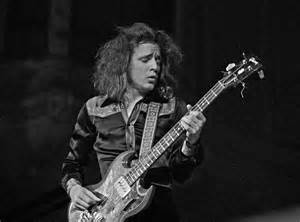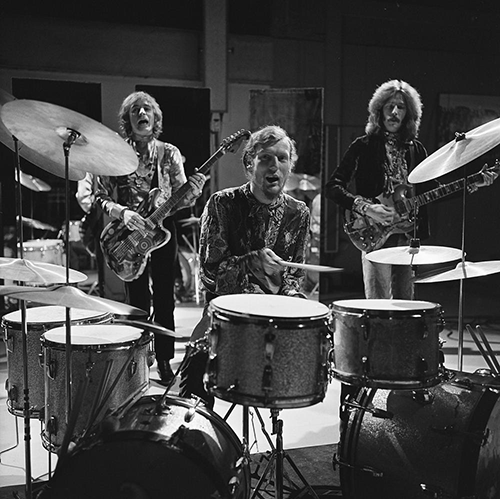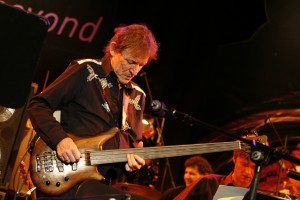
“Jack Bruce Hamburg 1972” by Heinrich Klaffs – originally posted to Flickr as Jack Bruce 1001720034. Licensed under CC BY-SA 2.0 via Wikimedia Commons.
aNewDomain.net — On October 25th, 2014 the world of music lost the great Jack Bruce. A Scotsman from a working poor background in Glasgow, John Symer Asher “Jack” Bruce became famous for being one-third of the first true power trio and the first true supergroup in rock ‘n’ roll music history: Cream.
Cream was also the band that brought guitar player Eric Clapton before the eyes of the world. While the blues guitar wizard has remained Cream’s most famous member, it was Bruce who, in reality, was the band’s major songwriter and usual lead singer.
Bruce, who could play the piano, cello, and guitar in addition to bass, wrote (collaborating with lyricist Pete Brown) such timeless Cream hits as “White Room,” “Sunshine of Your Love,” and “I Feel Free.”
Bruce had a soaring, soulful, gospel and classically trained voice that Clapton’s gravelly pipes couldn’t match. Without Bruce’s musical abilities and singing prowess, Cream likely would never have risen to superstar status.
Cream of the Crop
What truly drove Cream to the top (besides Clapton’s extended blues solos) was Jack Bruce’s electric bass playing in conjunction with the kinetic drumming of Ginger Baker. With the way Bruce approached the electric bass, Cream brought rock music a fluid, melodic and thundering rhythm section the likes of which had never been conceived of in blues or rock ‘n’ roll. The dynamic, jazz-inspired bottom end of the group’s music was the perfect counterpart to Clapton’s blues licks.
Bruce wanted to play his instrument ever since he saw a double-bass in his school orchestra. But the 11-year-old’s hands weren’t big enough to handle the strings, so he began to practice the cello instead. By the time his hands (and the rest of him) had grown, Bruce was ready to return to the instrument that was his first love.
And that was a great thing for the world.
[youtube http://www.youtube.com/watch?v=xFrX-dJwsts?rel=0]
Video: Cream Strange Brew Documentary part 1 of 4
In the summer of 1966, when Cream was formed, the electric bass was nobody’s instrument of choice. It didn’t have the glamour of lead vocals or electric guitar. There weren’t any bass heroes. Even Paul McCartney admitted that the only reason he took up the bass was because nobody else in The Beatles would consider playing it.
Jack Bruce viewed the instrument in a completely different way. He saw no reason why the electric bass couldn’t be a co-lead instrument with the electric guitar, while still serving its primary role as the fluid bridge between melody and percussion. This was an important concept for a rock trio, in which each band member had to be able to fill up a whole lot of sonic space.
With his musical gifts and a pioneering approach on his Gibson EB-3, Bruce became the most influential electric bass player in rock music history. And Cream arguably became the seminal jazz-rock fusion band (although the band never actually played jazz), while spearheading the way for the success of bands like Led Zeppelin and Black Sabbath. Cream was undoubtedly the prototype for Rush.
Whipped Cream
Cream sold a staggering 35 million records and received the first platinum record award in music history for Wheels of Fire. They sold out packed concert halls and had a reputation for astounding extended improvisations, but all that fame occurred in 29 short months. There’s a reason why the band only lasted for those 29 months: The love-hate relationship of Bruce and drummer Ginger Baker.

“Cream on Fanclub 1968 (2)” by Omroepvereniging VARA – Licensed under Creative Commons Attribution-Share Alike 3.0-nl via Wikimedia Commons
The two men loved each other as musicians, but when the music stopped, the hatred brewed.
Bruce and Baker first played — and quarreled — together in 1965 as the rhythm section in the pioneering English R&B quartet the Graham Bond Organisation, a band that also featured future jazz guitar grand master John McLaughlin. One story goes that Bond decided he wanted Bruce out of the band, possibly for stirring up the trouble — Bruce garnered a reputation for speaking “candidly” — but he left it to Baker to actually tell Bruce. Bruce, this story says, never really forgave Baker for being Bond’s messenger of doom.
Bruce then joined John Mayall’s Bluesbreakers, a band which at the time featured Eric Clapton on guitar. But Clapton wasn’t happy in that band, so he and Bruce left to join the (very) short-lived band Powerhouse. During this time, Clapton received a call from Ginger Baker who wanted to inquire about forming a new band with the budding blues guitar wizard. Baker was floored when Clapton said yes, but that he also wanted Bruce to be the new band’s bass player.
Still revering Bruce as a musical genius, Baker decided to see if he could mend ways with him. (Later on in his life he would say that his then-wife, Liz, was the one who convinced him to try.) Cream, so named because each band member regarded the other two as “cream of the crop” musicians, was formed in July of 1966.
The musical chemistry was immediate and success quickly followed. Alas, so did the old Baker-Bruce animosity — sometimes visibly, on stage. Baker became known for accusing Bruce of turning up his bass amplifiers to such a high volume that not only were the drums drowned out of the mix but his own hearing was compromised.
Clapton repeatedly found himself thrust into the role of mediator and peacemaker between the other two Cream members. This soon took a toll on his energy, and he decided to split the band in the Autumn of 1968. Cream played its farewell concert on November 25th of that year at Royal Albert Hall.
After Cream
Bruce made plenty of music after the demise of the band that brought him fame and wealth (which he squandered on drugs that would eventually ruin his liver and kill him). He would go on to be in some important bands of the 1970s, including the jazz-fusion powerhouse The Tony Williams Lifetime, where he once again played with John McLaughlin, and the short-lived but significant Cream-like trio of West, Bruce, and Laing.
In 1976, Bruce began playing the fretless bass while continuing to compose and play jazz, bluesy hard rock, and fusion. He continued to inspire whole new generations of modern musicians.

“JackBruce & fretless bass” by Christian Sahm – http://www.flickr.com/photos/christian_sahm/281256142/. Licensed under CC BY-SA 2.0 via Wikimedia Commons.
By that time Bruce had already begun the slow fade from major commercial success in music. He always placed music above money, and by his own admission the impoverished Scottish kid didn’t handle his wealth too well once he had made it big. His musical eclecticism and genius, ironically enough, are what drove him out of the mainstream’s attention after Cream was done.
Speaking with music journalist Geoffrey Himes in 2012, Bruce said:
“It was very exciting to put those two musics [jazz and rock] together, but something went wrong and it became very formulaic and bland. It started out as jazz-rock and then it became fusion, which wasn’t so good. That’s a danger with all movements in music; they start out very exciting and become predictable.”
Upon learning the news of his death, Ginger Baker released a statement in which he said, “I am very sad to learn of the loss of a fine man, Jack Bruce…My thoughts & wishes are with his family at this difficult time.”
We will miss you, Jack. You once believed that you wouldn’t make it to age 30, but you got to 71. Carry on.
For aNewDomain, I’m Brant David.
Brant David McLaughlin — aka Brant David — is a Milford, NJ-based senior writer for us here at aNewDomain. Follow him at his +BrantDavid Google+ page. Email him at Brant@aNewDomain.net.













[…] as it may be to many (including some of Rush’s fervent fans), there was an incarnation of the Cream-like power trio that preceded the days of living legend Peart. Those days saw the band’s rhythm […]